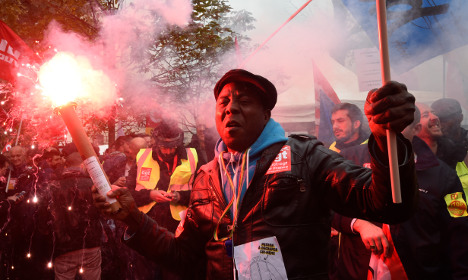Air France-KLM profits took off in the third quarter, boosted by low fuel prices and heavy summer travel, but the airline said Thursday it will continue on its cost-cutting course despite protests by employees.
The company's operating profit almost reached €900 million, the highest level for the summer period since the Air France merged with KLM in 2004.
The airline group posted a net profit in the July-September period of €480 million ($526.5 million) compared with €86 million a year earlier when results suffered from a pilots' strike, it said in a statement.
“A favourable environment, principally characterized by lower fuel prices and strong demand over the summer, resulted in an improvement of Air France-KLM's results during the third quarter and first nine months of 2015,” said the group's board chairmen Alexandre de Juniac.
Quarterly revenues were €7.4 billion, up 4.2 percent compared with a year ago excluding the impact of the strike impact, and down 2.4 percent on a like-for-like basis.
The company's operating profit meanwhile almost reached €900 million, the highest level for the summer period since the Air France merged with KLM in 2004.
De Juniac stressed, however, that the results were not sufficient to close the “competitiveness gap” and promote growth, so the airline would continue with its restructuring plan.
“The implementation of the Perform 2020 plan is therefore vital since unit cost reduction is Air France-KLM's main lever enabling the group to return to a profitable growth path in a highly competitive environment,” he said, calling on “union representatives to resume negotiations as soon as possible”.
The struggling airline's restructuring plan made headlines around the world earlier this month when executives were manhandled by furious workers, sparking concerns that the violence was just one of the symptoms of France's overall economic and social malaise.
In a bid to mitigate the damage to the airline's image, Human resources chief Xavier Broseta, who was featured on front pages after he was forced to scale a fence, naked from the waist up, to escape angry union militants, has appeared in a video produced by the company saying “What you saw (in that incident) was not the real face of Air France”.
Another executive, Pierre Plissonnier, also had his shirt and jacket ripped in the rowdy scenes.
Five employees at the airline — which merged with Dutch national carrier KLM in 2004 — were detained and will face trial on December 2 for their alleged role in the violence.
But the employees' protests have continued with just last week thousands joining demonstrations across France after the airline confirmed it would axe 1,000 workers next year.
French President Francois Hollande said layoffs at the airline could still be avoided “if pilots do what is needed, if management makes proposals, if the ground personnel wakes up to certain realities.”
On Thursday unions were quick to react.
“Management is always saying there is still not enough… we are being endlessly squeezed, there is no view toward maintaining employment,” said Miguel Fortea, head of the CGT union at Air France, urging a meeting between the airline, the unions and the French government.
Shares in Air France-KLM sank 2.24 percent to €6.59 around midday in Paris.



 Please whitelist us to continue reading.
Please whitelist us to continue reading.
Member comments